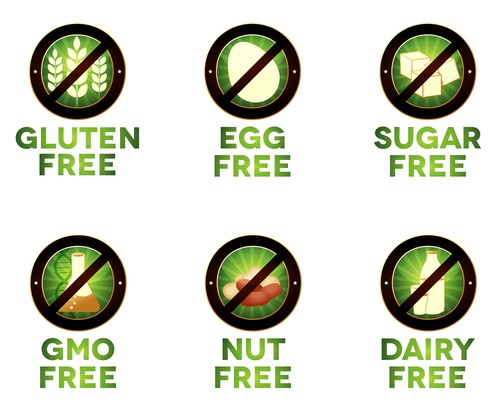When a harmful food product is ingested, a two-stage elimination process begins to take place. The first is an attempt to neutralize the harmful substances, and the second is through excretion: feces, urine, expired air and transpiration. But, what happens if these elimination routes are overloaded, for example, due to an excess in the amount of food eaten? The way the human body deals with this problem depends on several factors: genetics, the amount of food eaten, the general health of the individual, their personal history with that particular food, etc.
Depending on these factors, we are programmed to deal with inadequate foods in one of two ways: using ‘extraordinary’ routes of elimination or storing harmful substances where they do not cause any immediate harm.
The ‘extraordinary’ route for elimination is the immune system. It cleans our body of the harmful substances that have entered our blood circulation due to overloaded or low-functional routes of elimination. This may be due, for example, to the leaky gut syndrome; constipation; an overloaded liver due to large quantities of ingested toxic products or toxins, stress, depression or any other emotional problem that reduces the energy of our organs; lack of sleep, or rest; etc.
But the immune system’s action creates inflammation, with its consequent effects: pain, mucus or pus, swelling and redness. These are the common symptoms of strong respiratory or dermatological allergies such as rinitis, asthma, eczema or Quincke’s Edema; but also common diseases such as colds, coughs, flu, bronquitis, etc.
And when we need urgent elimination due to the dangerousness of these products, the elimination process is accelerated with vomiting and diarrhea.
In the case where the organism opts to store undesirable substances instead of eliminating them, we encounter an increase in weight. The advantage for these individuals is that they do not suffer from illnesses of elimination, but the transport of these substances until the point of storage is not without cost: that’s where cardiovascular diseases appear.
Subsequently, these substances will end up by dirtying the extracellular environment, and harming tissues and organs of the body, forming ulcers, cysts, and even cancer.
In autistic children, for example, it seems their disorder may be due to a deficient detoxification system, which entails an accumulation of heavy metals in the brain.
Most people tend to be a mix of these two types (elimination and storage), such that under certain circumstances, they may suffer from acute or chronic inflammatory elimination illnesses, according to their energetic state and the food ingested, and under other circumstances will tend to store them where it is least harmful.
So to answer to the question of the title (Food Intolerances: do they only affect some people?): everyone has some type of intolerance and/or allergy. What is different is the way that it manifests itself, with gastroenterological; or dermatological; or respiratory; or cardiovascular; or inflammatory illnesses.
In medical jargon, it is considered that those who do not react with elimination, as in, with allergies and/or intolerances, tolerate all foods. Simply, due to being overweight, they are recommended to eat less and do more exercise. But the problem is much more serious, and it must be treated in the same way as with a person who has intolerances/allergies; the solution is much more complex than simply reducing the food intake and doing more exercise.
If, in face of certain foods, the human body either tries to eliminate them or store them where they do not cause any issues, could it not be that certain foods are simply not as healthy as we thought? Instead of blaming the human body for rejecting certain foods, perhaps we should question whether the problem lies in the foods that we eat, and the circumstances that affect digestion, as in, our entire way of life, from exercise to our emotional and spiritual lifestyle.
Depending on these factors, we are programmed to deal with inadequate foods in one of two ways: using ‘extraordinary’ routes of elimination or storing harmful substances where they do not cause any immediate harm.
The ‘extraordinary’ route for elimination is the immune system. It cleans our body of the harmful substances that have entered our blood circulation due to overloaded or low-functional routes of elimination. This may be due, for example, to the leaky gut syndrome; constipation; an overloaded liver due to large quantities of ingested toxic products or toxins, stress, depression or any other emotional problem that reduces the energy of our organs; lack of sleep, or rest; etc.
But the immune system’s action creates inflammation, with its consequent effects: pain, mucus or pus, swelling and redness. These are the common symptoms of strong respiratory or dermatological allergies such as rinitis, asthma, eczema or Quincke’s Edema; but also common diseases such as colds, coughs, flu, bronquitis, etc.
And when we need urgent elimination due to the dangerousness of these products, the elimination process is accelerated with vomiting and diarrhea.
In the case where the organism opts to store undesirable substances instead of eliminating them, we encounter an increase in weight. The advantage for these individuals is that they do not suffer from illnesses of elimination, but the transport of these substances until the point of storage is not without cost: that’s where cardiovascular diseases appear.
Subsequently, these substances will end up by dirtying the extracellular environment, and harming tissues and organs of the body, forming ulcers, cysts, and even cancer.
In autistic children, for example, it seems their disorder may be due to a deficient detoxification system, which entails an accumulation of heavy metals in the brain.
Most people tend to be a mix of these two types (elimination and storage), such that under certain circumstances, they may suffer from acute or chronic inflammatory elimination illnesses, according to their energetic state and the food ingested, and under other circumstances will tend to store them where it is least harmful.
So to answer to the question of the title (Food Intolerances: do they only affect some people?): everyone has some type of intolerance and/or allergy. What is different is the way that it manifests itself, with gastroenterological; or dermatological; or respiratory; or cardiovascular; or inflammatory illnesses.
In medical jargon, it is considered that those who do not react with elimination, as in, with allergies and/or intolerances, tolerate all foods. Simply, due to being overweight, they are recommended to eat less and do more exercise. But the problem is much more serious, and it must be treated in the same way as with a person who has intolerances/allergies; the solution is much more complex than simply reducing the food intake and doing more exercise.
If, in face of certain foods, the human body either tries to eliminate them or store them where they do not cause any issues, could it not be that certain foods are simply not as healthy as we thought? Instead of blaming the human body for rejecting certain foods, perhaps we should question whether the problem lies in the foods that we eat, and the circumstances that affect digestion, as in, our entire way of life, from exercise to our emotional and spiritual lifestyle.
 A food intolerance or allergy is a rejection of a certain food that can manifest itself in one or several of many ways, though principally in the form of gastrointestinal and dermatological problems.
A food intolerance or allergy is a rejection of a certain food that can manifest itself in one or several of many ways, though principally in the form of gastrointestinal and dermatological problems.











